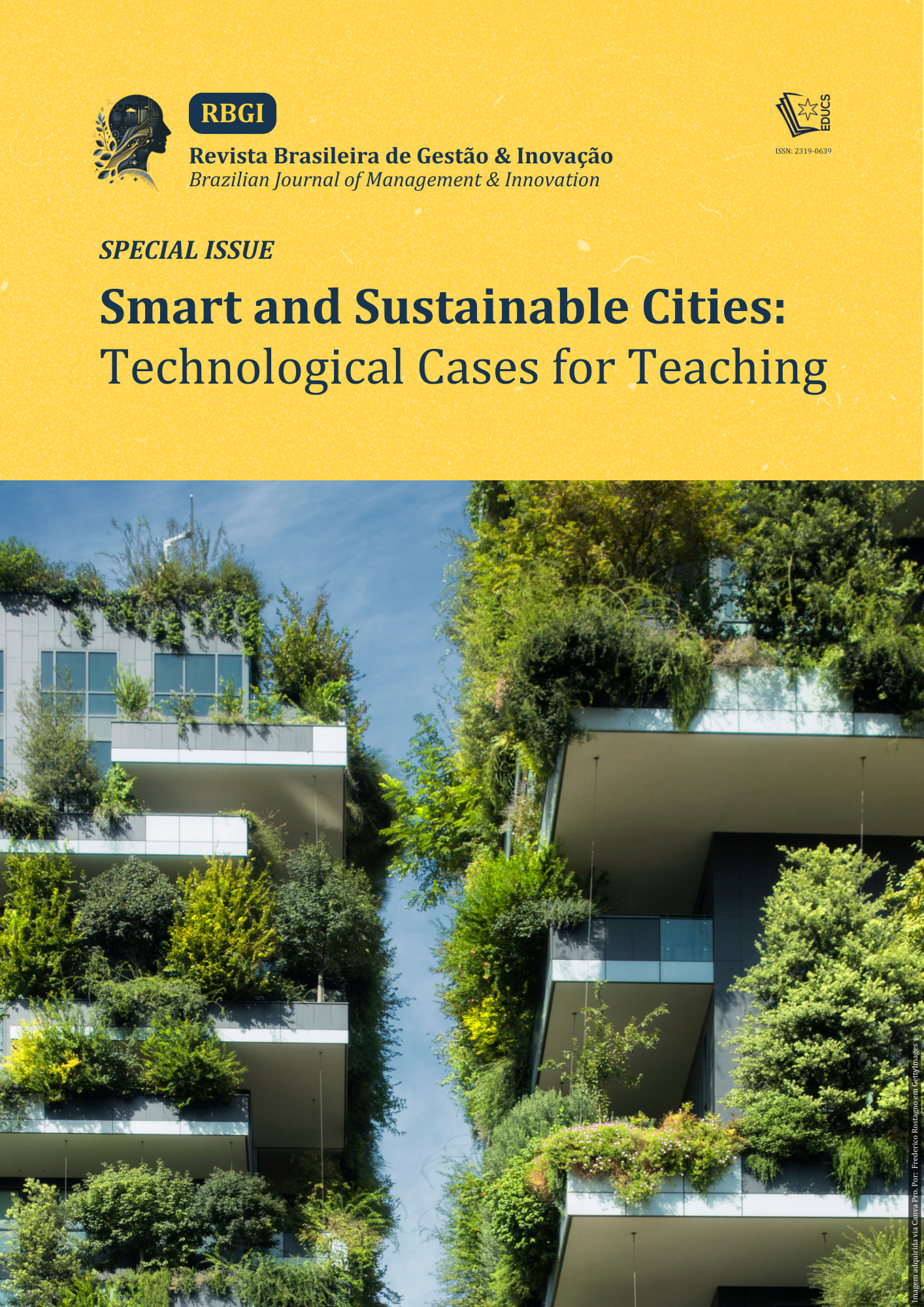ESTRATÉGIAS SUSTENTÁVEIS E RESILIÊNCIA: USO DE DADOS PARA SUPERAR DESAFIOS MUNICIPAIS
DOI:
https://doi.org/10.18226/23190639.v11n4.01Keywords:
Desenvolvimento Urbano, Gestão Pública, Dados Municipais, Objetivos do Desenvolvimento Sustentável (ODS), ISO37123Abstract
Objetivo: Investigar os desafios enfrentados por uma comissão universitária de sustentabilidade urbana ao buscar dados confiáveis para apoiar estratégias de gestão pública municipal, no contexto da Agenda 2030 e dos ODS.
Design/Método/Abordagem: Estudo de caso qualitativo e exploratório, baseado na análise de um evento envolvendo 32 municípios da Serra Gaúcha (RS), integrando coleta de dados secundários, observação e articulação multissetorial, com ênfase na norma NBR ISO 37123.
Originalidade/Relevância: Ao destacar a dificuldade de acesso a dados atualizados em regiões afetadas por eventos climáticos extremos, o estudo revela a urgência da gestão de conhecimento integrada e adaptativa como base para a formulação de políticas públicas resilientes.
Principais Resultados/Descobertas: Constatou-se que a ausência de sistemas estruturados de dados compromete a continuidade de projetos sustentáveis. A norma NBR ISO 37123 foi apontada como ferramenta promissora para o alinhamento entre os ODS e a resiliência urbana local.
Contribuições/Implicações Teóricas/Metodológicas: O caso ilustra como estruturas normativas e dados confiáveis podem apoiar a integração entre gestão pública, conhecimento técnico-científico e planejamento estratégico municipal, especialmente em contextos de vulnerabilidade ambiental.
Contribuições Sociais/Gerenciais: O estudo oferece subsídios para gestores públicos, educadores e formuladores de políticas, ao mostrar que a cooperação entre diferentes setores e o uso de indicadores de resiliência são fundamentais para decisões mais eficazes e sustentáveis.
References
Atlas do Perfil Socioeconômico Corede Serra. FEE. Fundação de Economia e Estatística. Porto Alegre. 2021.
Bhattacharya, T. R.. Bhattacharya. A.. Mclellan, B.. Tezuka, T.. (2020). "Sustainable smart city development framework for developing countries," Urban Research & Practice, Taylor & Francis Journals, vol. 13(2), pages 180-212.
Carrillo, F. J. (2006). Knowledge cities: approaches, experiences and perspectives. [S.l.]: Routledge.
Carrillo, F.J.. Yigitcanlar, Tan. Garcia, Blanca. Lonngvistl, Antti. (2014). Knowledge and the city: Concepts, applications and trends of knowledge-based urban development. Routledge.
Carrillo, F.J. (2014). What 'Knowledge-based'stands for? A position paper. International Journal of Knowledge-Based Development, 5(4), 402-421.
Carrillo, F.J. (2015). Knowledge-based development as a new economic culture. J. open innov. 1, 15. https://doi.org/10.1186/s40852-015-0017-5
CNN Brasil. (2023) Disponível em <https://www.cnnbrasil.com.br/nacional/ rio-grande-do-sul-tem-terceiro-ano-de-seca-e-isso-nao-e-normal-diz-professor/>
Fachinelli, A. C., Carrillo, F. J. & D’Arisbo, A. (2014). Capital system, creative economy and knowledge city transformation: insights from Bento Gonçalves, Brazil. Expert Systems with Applications.41(12), 5614-5624.
IBGE (2010). Censo 2010. Disponível em https://censo2010.ibge.gov.br/resultados.html
Yigitcanlar, T., Velibeyoglu, K. and Martinez‐Fernandez, C. (2008), "Rising knowledge cities: the role of urban knowledge precincts", Journal of Knowledge Management, Vol. 12 No. 5, pp. 8-20. https://doi.org/10.1108/13673270810902902
Marchetti, D. Oliveira, R. Figueira, A. R. (2019). Are global north smart city models capable to assess Latin American cities? A model and indicators for a new context. Cities, Vol. 92, 2019, pages 197-207. ISSN 0264-2751. https://doi.org/10.1016/j.cities.2019.04.001.
OPEN DEFINITION. (2015) The Open Definition. [Online] . Disponível em: <http://opendefinition.org/>
Yigitcanlar, T. (2009), "Planning for knowledge‐based urban development: global perspectives", Journal of Knowledge Management, Vol. 13 No. 5, pages 228-242. https://doi.org/10.1108/13673270910988079
W3C, O. W. G. (2012). W3C Recommendation. Cambridge, MA, EUA
Downloads
Published
How to Cite
Issue
Section
License
Copyright (c) 2024 Rafael de Lucena Perini, Ana Cristina Fachinelli, Cintia Paese Giacomello, SUANE DE ATAYDE MOSCHEN, Bianca Libardi, Giancarlo Dal Bó, Vanessa Roveda

This work is licensed under a Creative Commons Attribution 4.0 International License.
The author must guarantee that:
- there is full consensus among all the coauthors in approving the final version of the document and its submission for publication.
- the work is original, and when the work and/or words from other people were used, they were properly acknowledged.
Plagiarism in all of its forms constitutes an unethical publication behavior and is unacceptable. Revista Brasileira de Gestão e Inovação has the right to use software or any other method of plagiarism detection.
All manuscripts submitted to RBGI - Revista Brasileira de Gestão e Inovação go through plagiarism and self-plagiarism identification. Plagiarism identified during the evaluation process will result in the filing of the submission. In case plagiarism is identified in a manuscript published in the journal, the Editor-in-Chief will conduct a preliminary investigation and, if necessary, will make a retraction.
This journal, following the recommendations of the Open Source movement, provides full open access to its content. By doing this, the authors keep all of their rights allowing Revista Brasileira de Gestão e Inovação to publish and make its articles available to the whole community.
RBGI - Revista Brasileira de Gestão e Inovação content is licensed under a Creative Commons Attribution 4.0 International License.
Any user has the right to:
- Share - copy, download, print or redistribute the material in any medium or format, linking to RBGI site.
- Adapt - remix, transform and build upon the material for any purpose, even commercially.
According to the following terms:
- Attribution - You must give appropriate credit, provide a link to the license, and indicate if changes were made. You may do so in any reasonable manner, but not in any way that suggests the licensor endorses you or your use.
- No additional restrictions - You may not apply legal terms or technological measures that legally restrict others from doing anything that the license permits.
#RBGI







